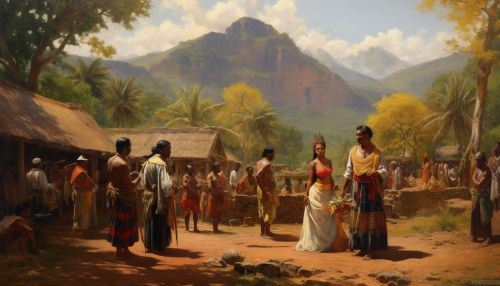Colonialism
Introduction
Colonialism is a historical phenomenon involving the establishment, exploitation, maintenance, acquisition, and expansion of colonies in one territory by people from another territory. It is a process whereby the metropole claims sovereignty over the colony and the social structure, government, and economics of the colony are changed by colonizers from the metropole. Colonialism is a set of unequal relationships between the metropole and the colony and between the colonists and the indigenous population.
Definition and Types
Colonialism is defined as the policy or practice of acquiring full or partial political control over another country, occupying it with settlers, and exploiting it economically. The term is frequently used to describe the settlement of lands in the Americas, Australia, Africa, and parts of Asia by people from areas generally recognized as 'old world' - Europe, Africa, and Asia.
There are four recognized types of colonialism, each with their own specific characteristics: settler colonialism, exploitation colonialism, surrogate colonialism, and internal colonialism.
Settler colonialism involves large-scale immigration, often motivated by religious, political, or economic reasons. The colonists displace the indigenous population, often violently, and replace them with a new society of settlers. Examples include the colonization of the Americas, Australia, and New Zealand.
Exploitation colonialism involves fewer colonists and focuses on the exploitation of natural resources or indigenous labor to benefit the metropole. This form of colonialism often uses a system of direct rule, maintaining control over the indigenous population through military force and political structures. Examples include the Belgian Congo and the Dutch East Indies.
Surrogate colonialism involves a colonial power appointing indigenous leaders as their intermediaries. These leaders, known as 'surrogates', are charged with maintaining control over the indigenous population and facilitating the extraction of resources. Examples include the British raj in India and the Dutch rule in Indonesia.
Internal colonialism involves the exploitation of ethnic or cultural minorities within a country by a dominant majority. Examples include apartheid in South Africa and the treatment of Native Americans in the United States.


History and Development
Colonialism has a long history starting with the pre-colonial indigenous cultures that were invaded and colonized by Europeans from the 16th to the 20th centuries. The age of modern colonialism began about 1500, following the European discoveries of a sea route around Africa's southern coast (1488) and of America (1492). With these events sea power shifted from the Mediterranean to the Atlantic and to the emerging nation-states of Portugal, Spain, the Dutch Republic, France, and England.
Impact and Legacy
The impact and legacy of colonialism is a controversial topic that has been studied from many perspectives. Colonialism had a profound effect on the world, shaping modern nations and influencing the present geopolitical landscape. The economic, political, and social effects of colonialism are still evident in many countries today.
